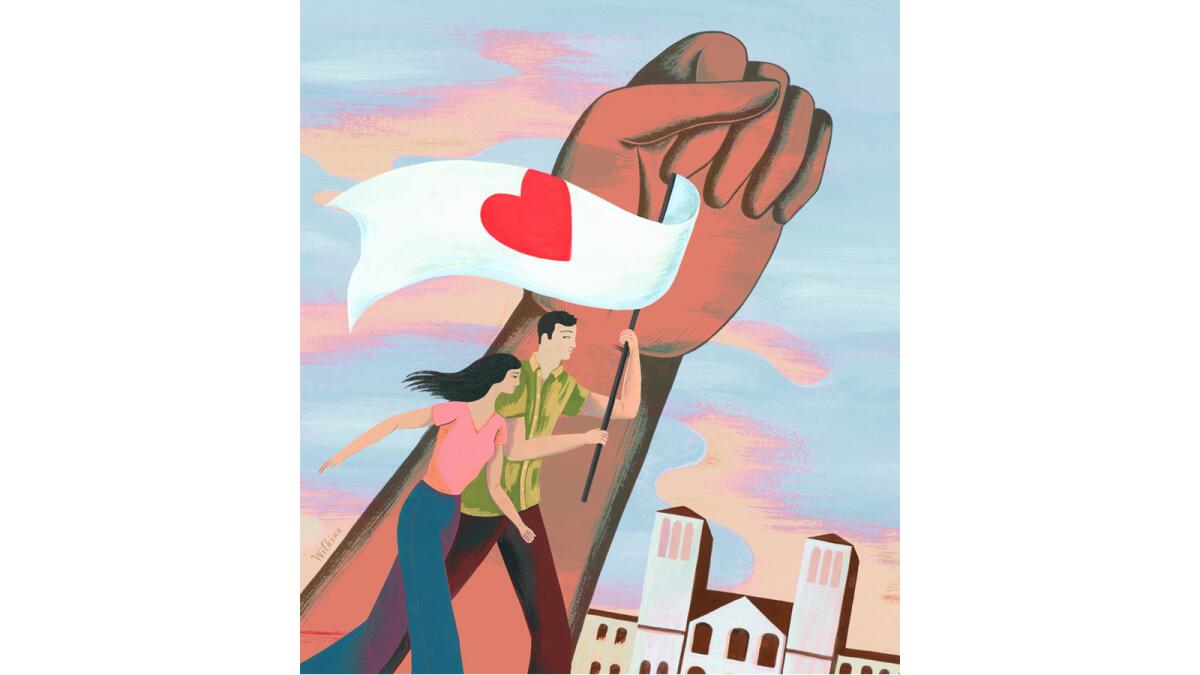L.A. Affairs: I had to work up the nerve to ask, ‘Do you want to be my girlfriend?’

- Share via
When it came to girls, I was shy.
It’s not that I feared that they would beat me up, like the bullies I evaded on the playground in East Los Angeles. I simply feared rejection.
For some mysterious reason that I still don’t understand, I felt that if I got rejected, all my friends and complete strangers would find out and make fun of me for eternity. I didn’t want to be that kid. Life was difficult enough trying to survive in the projects. It didn’t help that I’ve been thin all my life. As a teenager, for instance, when most of my friends joined a local gang, my gang “application” was rejected since I couldn’t defend the neighborhood.
Once I arrived at UCLA as a freshman, my entire world changed.
Being one of the few Chicanos on campus, I became a student activist. I began to break out of my shyness. From advocating for immigrant rights to demanding more racial minorities in higher education, I became passionate and bold. By my sophomore year I was co-chair of the Chicano Education Project (ChEP), through which UCLA students mentored underprivileged students in public high schools about college.
Are you a veteran of L.A.’s current dating scene? We want to publish your story
I will never forget that one organizational meeting when a beautiful Chicana, Antonia, joined us for the first time. She was a first-year student from the Westside and had it all: good looks, smarts and commitment to social change. Later, I found out that our parents had strikingly similar backgrounds. Both of our mothers, for instance, worked as domestic workers and our fathers first arrived in the U.S. from Mexico as agricultural workers under the Bracero Program.
I initially thought that Antonia was out of my league. But with my new sense of confidence thanks to my student activism, I was no longer that math nerd in high school who perpetually found himself in the dreaded “friend zone” with girls.
I decided I just needed to be strategic in my approach, especially since I could sense that I had competition on campus.
Utilizing my new political skills, I developed a master plan. Before asking out Antonia for a date, I approached my competitors — or predators, as I fondly recall them — and told them of my intentions. For those who didn’t respect my request — actually, it was more like a demand — I had no option but to undermine them with Antonia.
Once I did away with the competition, I worked up the nerve to ask her out.
“It’s not like I want to be your boyfriend or anything like that, but do you want to do something off-campus, since my financial aid just arrived?” I recall asking her.
“Sure,” she said.
Looked like my new political skills were working. Well, it was more like stalking, since I “coincidentally” registered for the same classes as her and “accidentally” visited her dorm on more than one occasion.
On one such occasion she asked: “What are you doing at the dorms?”
“I’m recruiting for ChEP members to visit San Fernando High School,” I said, without missing a beat. (It helps when you stay up all night thinking about the different responses to potential questions, just like preparing for a college debate.)
After spending more time together, I decided to take the next step.
“It’s not like I want to marry you or anything, but do you want to be my girlfriend?” I asked.
We kissed in my blue VW Beetle and I said, “I think I’m in Disneyland.”
I’m just glad that nobody from my old neighborhood overheard me.
After leaving UCLA, we continued seeing each other.
Eventually, I popped the big question.
“Will you marry me?” I asked, with confidence.
“Yes!” she exclaimed.
Many moons later, as our son, Joaquin, will soon be applying for college, I wonder if he will have the same luck.
Huerta is an assistant professor of ethnic and women’s studies at California State Polytechnic University, Pomona.
L.A. Affairs chronicles the current dating scene in and around Los Angeles. We pay $300 a column. If you have comments or a true story to tell, email us at LAAffairs@latimes.com.
To read this article in Spanish, click here


